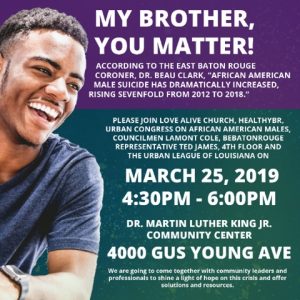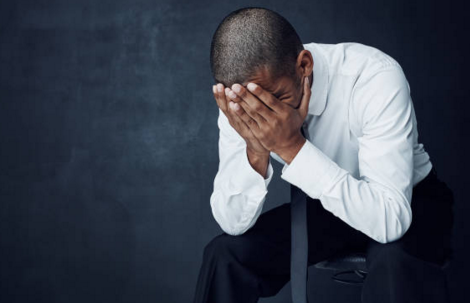by Donney Rose
On his 2018 album Book of Ryan, hip hop artist Royce da 5’9 raps about the importance of checking up on your ‘strong friend’ on a song aptly titled “Strong Friend”. In the song’s intro Royce gives listeners a sound piece of advice when he begins with the lines “reflections of your strong friend, you need to check up on your strong friend, nobody ever checks up on their strong friend”, a mantra that deeply resonates with the state of Black males in Baton Rouge. The African American community in Baton Rouge and its allies have been reeling from a recent report by the EBR Coroner’s Office that shows a sevenfold increase of Black male suicide between 2012 and 2018. According to the study by EBR Coroner, Dr. Beau Clark published in The Advocate newspaper, the number of African American male victims rose from a baseline of two or three in past years to 14 in 2018 and is a part of an alarming national trend. Dr. Clark’s ‘psychological autopsies’ have included interviews with loved ones of the deceased in efforts to get to the root of the crisis. Black men are ending their lives (primarily) by way of self-inflicted gunshots and drug overdoses. In a city that has a crippling median income gap between Black and white families, a disproportionate amount of incarcerated Black men and a highly under educated populace of young Black boys, what do these numbers really tell us about the will of African American males to persevere in a social climate rife with disadvantages?
Beyond socioeconomic challenges faced by Black males in Baton Rouge lies a dangerously unhealthy stigma around addressing poor mental health. According to recent studies, 1 out of 3 African Americans in need of mental health service receives proper treatment and when treated, receive a lower quality of care/care that is culturally aligned with specific challenges faced by Black people. Moreover, it has also been found that African Americans are less likely to be included in psychological research and of the research conducted, Black women are doubly times more likely to seek therapy for mental health related problems. There is a national trend of Black men self-medicating through illicit drugs (most commonly heroin) as a means of escaping certain psychological traumas. Baton Rouge, as a mid sized city, boasts one of the highest murder rates per capita, much of which is zip code specific. Which is to say Black male inhabitants of the city’s poorest zip codes are inundated with scenes of death on a regular basis, while carrying high levels of post traumatic stress disorder (PTSD) associated with seeing such consistent carnage. And over time the impact of existing in an ignored and disenfranchised community takes a toll on the psyche of its inhabitants, yielding a no-win perspective that leads to a devaluing of one’s life.
Data aside, as Black men in Baton Rouge, we are imprisoned by cultural and gender specific norms that suppress our vulnerabilities and drown our cries for help. The archetype of the southern Black male is one that is physically virile and emotionally detached. There is a presumed weakness and often misguided homophobia that comes with being emotionally in tune with ourselves. We subscribe to ideals that leave no room for weeping or emoting or talking through our mental deficiencies with anyone, expert or not. And because we are human, an extended period of bottled mental anguish can lead to extreme resolves, hence the suicide crisis we find ourselves in right now as a community.
So how do we remedy an epidemic we were not giving direct attention to? By acknowledging the wholeness of our humanity and giving ourselves space and opportunity to be helped. By giving ourselves parole from the self-imprisonment that binds us silent when we need to express a need for assistance. By recognizing that there is no silver bullet to solve the multi-faceted nuances of our humanity, but that a single bullet can erase any of us if we allow it to do the work of resolution. We can be proud & Black & southern & Baton Rouge & broken & fragile & scared & joyful & loved & triggered all at the same time. We can be whole. We are taking our own lives on account of reducing the fullness of self and resorting to tragically desperate measures when our whole selves are not being actualized. But there’s a better resolve, we just have to believe it first.
Donney Rose is a poet, essayist, community advocate, Kennedy Center Citizen Artist Fellow and Communications Catalyst at MetroMorphosis

© Copyright 2018 MetroMorphosis.




